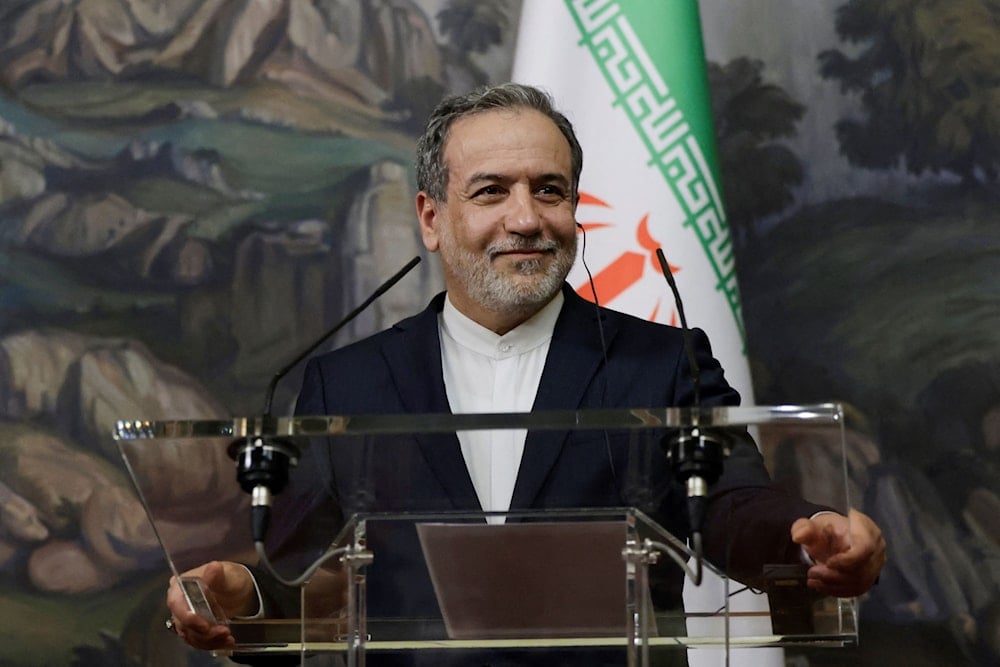Iran demands war compensation before resuming nuclear talks: Araghchi
Iranian Foreign Minister Abbas Araghchi says Iran won’t resume nuclear talks unless compensated for US-Israeli attacks and guaranteed no repeat strikes.
-

Iran's Foreign Minister Abbas Araghchi attends a joint press conference with the Russian foreign minister following their talks in Moscow on April 18, 2025. (PHOTO / POOL VIA AFP)
Iranian Foreign Minister Abbas Araghchi has stated that Tehran will not return to the negotiation table over its nuclear program unless the United States compensates Iran for the losses it suffered during the recent US-Israeli aggression. His remarks, published on Thursday in the Financial Times (FT), come amid mounting diplomatic uncertainty following "Israel's" 12-day war with Iran.
Speaking from Tehran, Araghchi emphasized that "business as usual" is no longer acceptable, pointing to what he described as an unprovoked assault that violated international law and severely damaged prospects for dialogue.
"They should explain why they attacked us in the middle of...negotiations, and they have to ensure that they are not going to repeat that [during future talks]," he said in an interview, adding, "And they have to compensate [Iran for] the damage that they have done."
Iran demands compensation for US-Israeli attacks
"Israel" launched an unprovoked war on Iran on June 13, assassinating military commanders, nuclear scientists, and civilians. A week later, the United States joined the assault by bombing three Iranian nuclear facilities, in breach of the UN Charter and the Nuclear Non-Proliferation Treaty (NPT).
In retaliation, Iran's Armed Forces launched precision strikes on strategic sites across the occupied Palestinian territories and the US’ al-Udeid air base in Qatar. By June 24, "Israel", under intense counterstrikes, sought a ceasefire.
Before the aggression, Iran and the United States had conducted five rounds of indirect talks aimed at reviving the Joint Comprehensive Plan of Action (JCPOA). The sixth round, scheduled for June 15 in Muscat and mediated by Oman, was scrapped due to the escalation.
Araghchi noted to the FT that the war had deeply eroded trust in US President Donald Trump, who withdrew from the 2015 deal during his first term. "Anti-negotiation feelings are very high," he said.
"People are telling me, 'Don’t waste your time anymore… if they come to negotiations it’s only a cover-up for their other intentions.'"
Iran’s conditions for future negotiations
While affirming that diplomacy remains possible, Araghchi made clear that any future Iran-US nuclear talks in 2025 must be preceded by clear commitments. "The road to negotiation is narrow, but it’s not impossible," he said, adding that "We need real confidence-building measures from their side."
These include financial compensation, assurances of non-aggression during talks, and a demonstrated commitment to a "win-win" solution.
Responding to Trump’s insistence on zero uranium enrichment, Araghchi reiterated Tehran’s firm stance on its right to enrichment under the NPT. "We can negotiate… but with zero enrichment, we don’t have a thing."
Iran's stance remains one of the key sticking points in any potential future deal. Araghchi also warned the E3, Britain, France, and Germany, that any attempt to trigger the snapback mechanism to reinstate UN sanctions would end all negotiations with Tehran.
"If they do snapback, that means that this is the end of the road for them," he said, adding, "With the Europeans, there is no reason right now to negotiate because they cannot lift sanctions, they cannot do anything."
The snapback mechanism threat, paired with perceived E3 inaction, has further undermined Iran’s trust in the European parties to the JCPOA.
Iran reaffirms to E3 uranium enrichment as non-negotiable
It is worth adding that on Saturday, Iranian Deputy Foreign Minister for Political Affairs, Majid Takht-Ravanchi, confirmed that uranium enrichment on Iranian soil remains a non-negotiable element in any future agreement, as reiterated during the latest talks in Istanbul.
In an interview with Turkey's Khabar Turk channel on Saturday, Takht-Ravanchi stated that the date and location of the next round of talks have yet to be determined. However, he emphasized that Istanbul is a preferred option for both Tehran and the European Troika, consisting of France, Germany, and the UK.
He also revealed that Iran and the United States are exchanging messages through intermediary states, underscoring the ongoing indirect diplomatic communication between the two sides.
The Iranian diplomat especially stressed that Tehran made it clear to European negotiators that uranium enrichment is a red line and must continue within Iran’s territory.

 4 Min Read
4 Min Read










